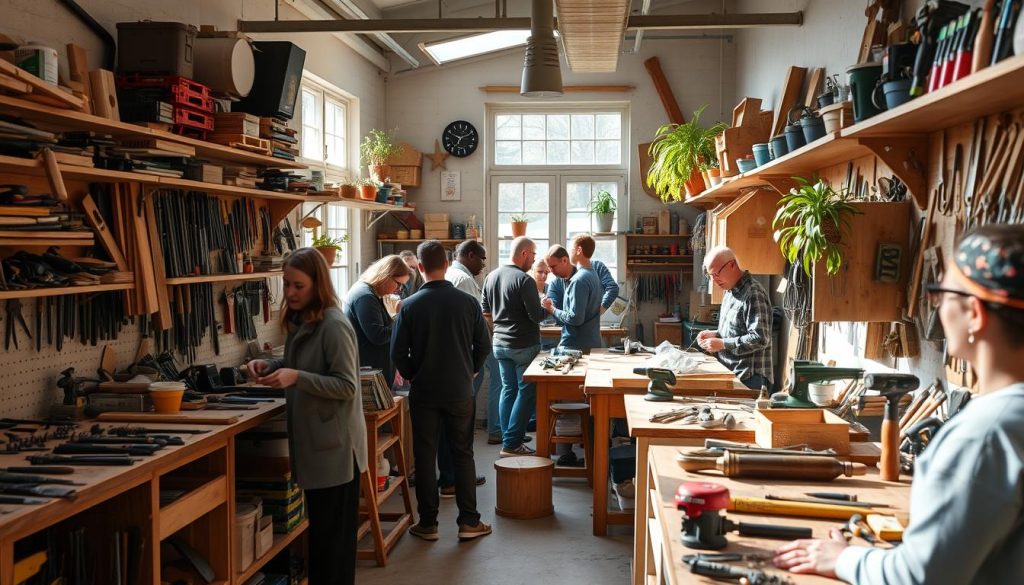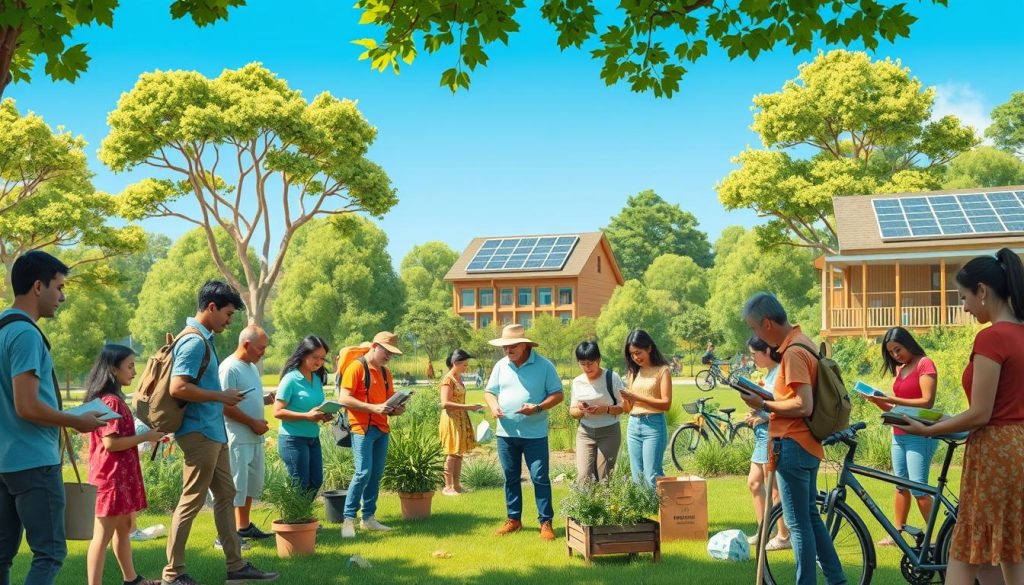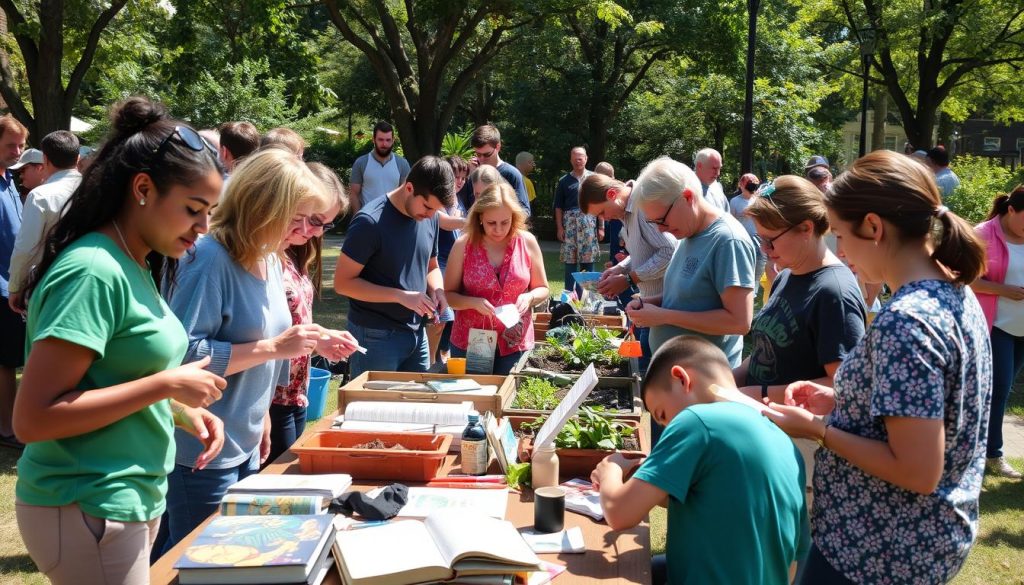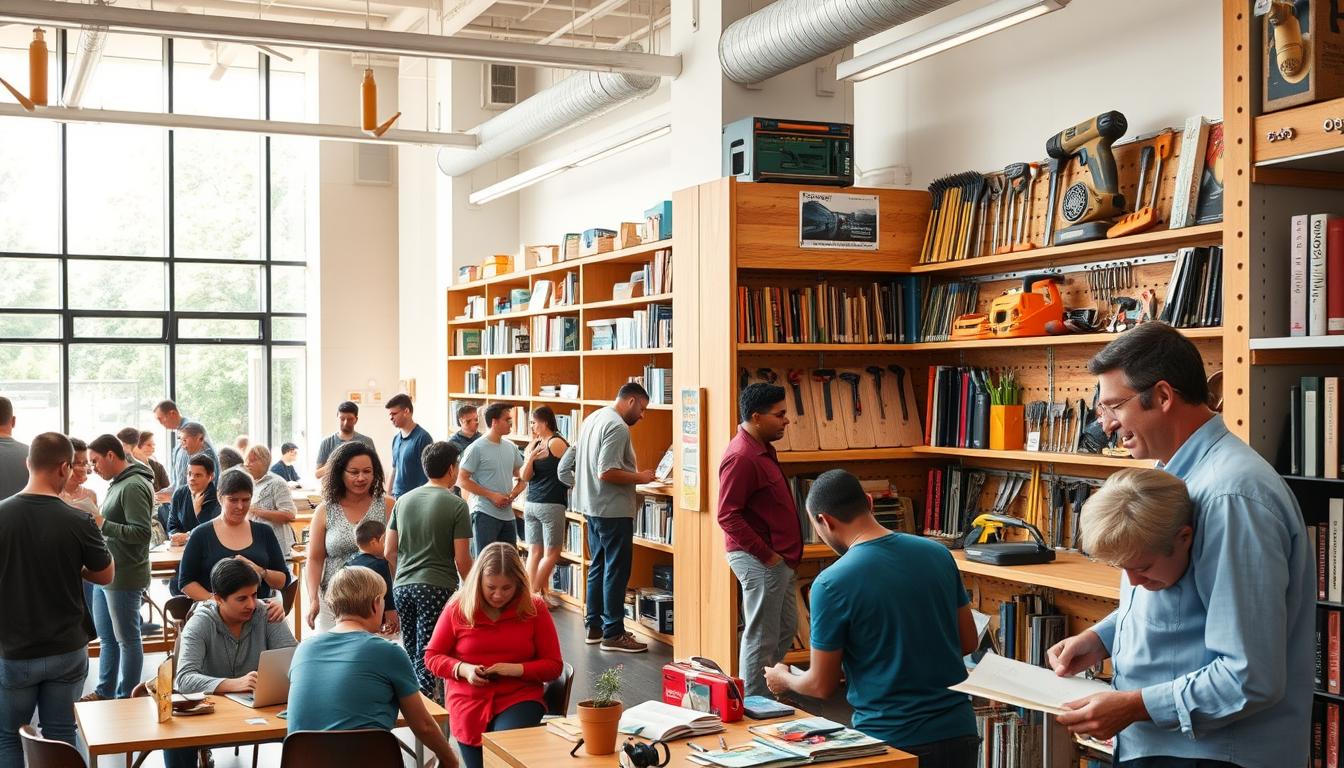In today’s fast world, sharing economies are becoming more popular. They offer a sustainable and cost-effective way to live. I’m excited to share how libraries and tool-sharing programs benefit our communities.
Sharing economies focus on “access over ownership.” This means we can meet our needs without owning everything. It’s changing how we use resources, from everyday items to special tools. By adopting collaborative consumption, we open up new possibilities.
We’ll explore the world of sharing economies, especially libraries and tool-sharing. These initiatives boost community spirit, save money, and protect our planet. Let’s discover how sharing economies can change our lives for the better.
Understanding Sharing Economies
Sharing economies are big in today’s world. They focus on access over owning things. This way, people and communities use resources better and more sustainably. It changes how we live, from how we get around to where we stay.
What Are Sharing Economies?
Sharing economies are about sharing or renting goods and services. They use tech and online platforms to make it happen. This cuts down on waste and promotes using what we already have.
It’s all about working together instead of buying everything ourselves. This is a new way of living and consuming.
Examples in Daily Life
Sharing economies are everywhere in our lives. Car-sharing services like Zipcar and Uber change how we travel. Co-working spaces help us work together better.
Community gardens and tool libraries are also part of it. Even Airbnb lets us share our homes. These examples show how we’re changing our use of resources for a greener future.
Sharing economies bring many benefits. They help us use resources better and work together more. As we move forward, these ideas promise a future that’s more collaborative, efficient, and kind to our planet.
The Role of Libraries in Sharing Economies
Libraries have always been places where people share knowledge and resources. Now, they’re even more important in our sharing economy. They help us understand the value of sharing and access over owning things.
How Libraries Promote Community Sharing
Libraries used to just lend books, but now they offer much more. They have digital media, tools, and even community spaces. This makes libraries key places for sharing, where everyone can get what they need without owning it.
Digital Libraries and Access to Resources
Digital technology has changed libraries a lot. Now, you can get e-books, audiobooks, and online courses from home. This makes learning and sharing easier for everyone, making libraries more inclusive and fair.
Libraries are crucial in our sharing economy. They teach us about sharing, being sustainable, and the importance of access. As we move forward, libraries will keep playing a big role in making our world more collaborative and open.
Benefits of Tool Sharing Programs

Tool sharing programs are gaining popularity, offering many benefits. They are part of the collaborative consumption movement. This movement promotes sharing and using resources wisely, which is good for the planet.
Cost Efficiency and Savings
One big plus of tool sharing is saving money. Instead of buying expensive tools, people can use them through these programs. This way, they pay much less than buying tools outright.
It helps people save money and avoid clutter. They don’t have to store and maintain tools they don’t use often. This makes using resources more efficient.
Reducing Clutter in Homes
Tool sharing also means less clutter at home. People don’t need to buy and store many tools. This frees up space and encourages a simpler way of living.
Tool sharing does more than save money. It helps use resources better and leads to a cleaner, more organized home. It’s a step towards living more sustainably.
How Libraries Facilitate Tool Sharing
Libraries are now more than just places for books. They offer tools and resources for DIY projects and home repairs. This helps create a community where people share and support each other.
Tools Available in My Local Library
My local library has a wide range of tools for borrowing. You can find everything from power drills and hammers to gardening tools and camping gear. They make it easy to find and reserve what you need.
Community Workshops and Events
The library also hosts workshops and events. These include DIY classes and tool maintenance clinics. They help people learn new skills and take care of shared tools.
Libraries are key in building a sharing community. They provide tools and education, helping people access what they need. This promotes sustainability and strengthens local bonds.
Environmental Benefits of Sharing Economies

Sharing economies are a bright spot for our future. They push for using resources wisely and sharing goods. This not only cuts down on waste but also makes people think more about the planet.
Less Waste Through Shared Resources
Sharing resources is a big win for the environment. It means fewer tools, books, and cars owned by each person. Instead, these items are shared, used more, and waste is lessened.
Encouraging Sustainable Practices
Sharing economies also teach us to use resources better. By sharing, we buy and own less. This change helps us live more sustainably and reduces our environmental impact.
Libraries are key in this shift. They offer access to many resources, from books to tools. This helps cut down on the need for personal ownership, promoting a greener way of living.
Tool-sharing programs in communities also help. They let people borrow tools, reducing the need for everyone to own their own. This makes resource use more efficient and sustainable.
The Social Aspects of Sharing Economies

Sharing economies offer more than just practical benefits. They create a space for meaningful connections and networking. By choosing access over ownership, we open up a world where people share resources, skills, and experiences.
Building Community Connections
Joining tool sharing programs or using digital libraries helps us meet our neighbors. It builds a sense of community. By borrowing or accessing shared resources, we can talk to others, share stories, and form bonds.
This togetherness can make our local communities stronger. People start to support each other’s needs more.
Networking Opportunities Through Shared Resources
The shared economy is also a place for people to connect and work together. Using shared tools or knowledge opens doors to networking. These connections can lead to learning new skills, exchanging ideas, and making valuable relationships.
By embracing community sharing, we open up a world of possibilities. It helps us build a more connected society.
The social side of sharing economies shows the power of human connection. By using the access over ownership model, we can make our communities more vibrant and supportive. It celebrates the value of shared resources and the relationships they create.
Challenges of Sharing Economies
Sharing economies, like peer-to-peer markets and product service systems, are becoming more popular. But, they face challenges like trust and responsibility issues, and keeping shared items in good shape.
Addressing Concerns of Trust and Responsibility
Trust is key in sharing economies, where people lend out their belongings. Libraries and tool sharing programs use strong user checks to build trust. They make sure users are responsible with shared items.
Clear rules and consequences for misuse help users feel they’re part of a team. This teamwork is important for the success of sharing economies.
Managing Maintenance of Shared Items
Keeping shared items in good condition is a big challenge. Libraries and tool sharing programs have staff or volunteers for this. They check and fix items regularly.
Users are also asked to report any problems. This way, items can be fixed or replaced quickly. Regular cleaning and maintenance keep items in top shape, making the experience better for everyone.
By tackling these challenges, sharing economies can grow and help communities. They promote sustainable living and teamwork.
Future of Sharing Economies in the United States
Sharing economies are growing, and I’m excited about the tech that will shape them in the U.S. New digital platforms are making it simpler to connect people and resources. This opens up new ways for us to share and live sustainably.
Technological Innovations in Sharing
Smart home devices and mobile apps are changing how we share. They help us share tools and vehicles easily. I think we’ll see more AI and blockchain soon. These will make sharing better and more trustworthy.
The Growing Importance of Community Engagement
Technology will help sharing economies grow, but community is key. As people see the benefits of sharing, like saving money and helping the planet, they’ll want more. Libraries and local groups will help by creating spaces for sharing and learning.

